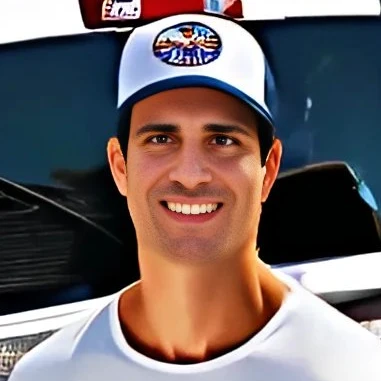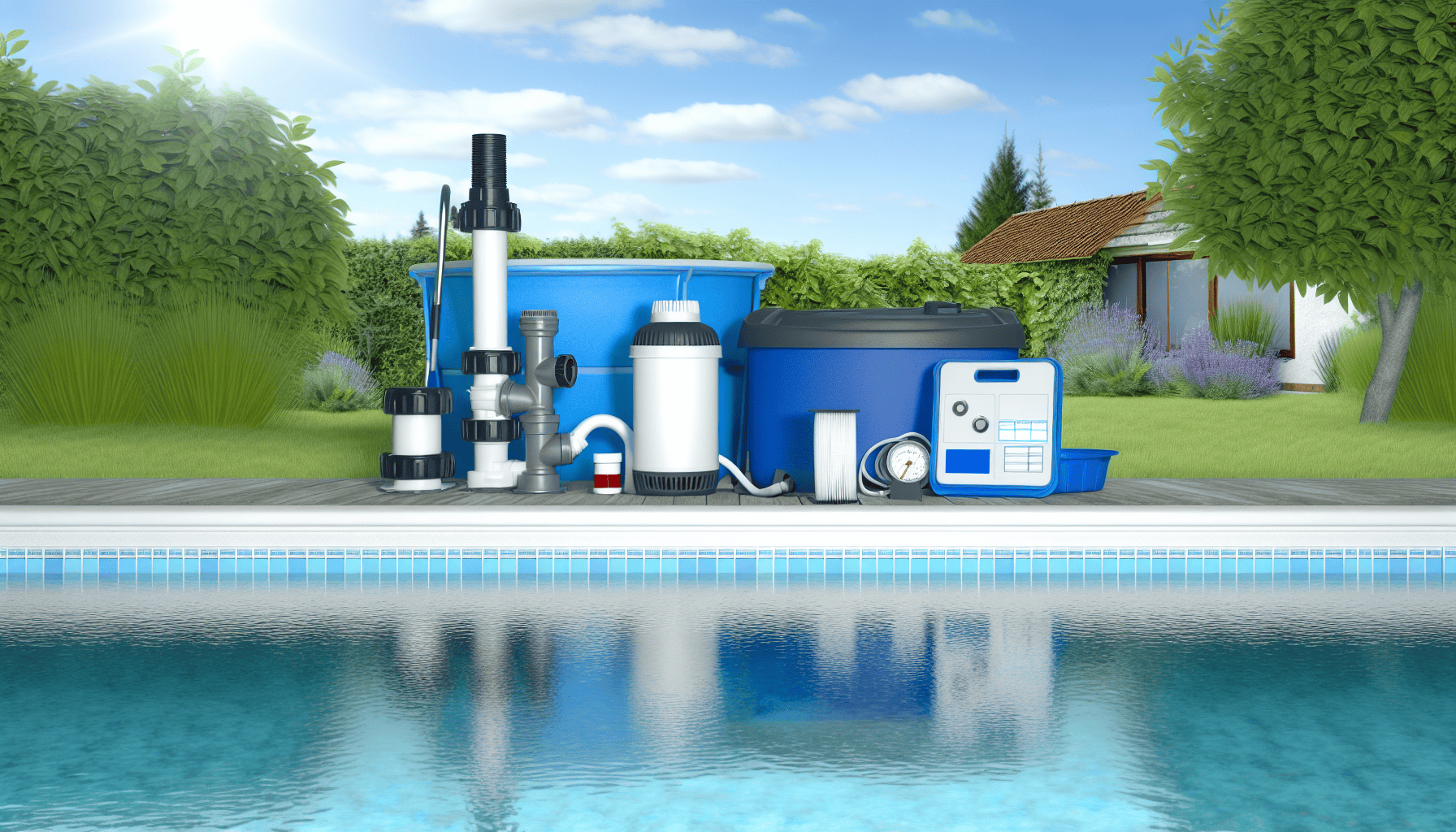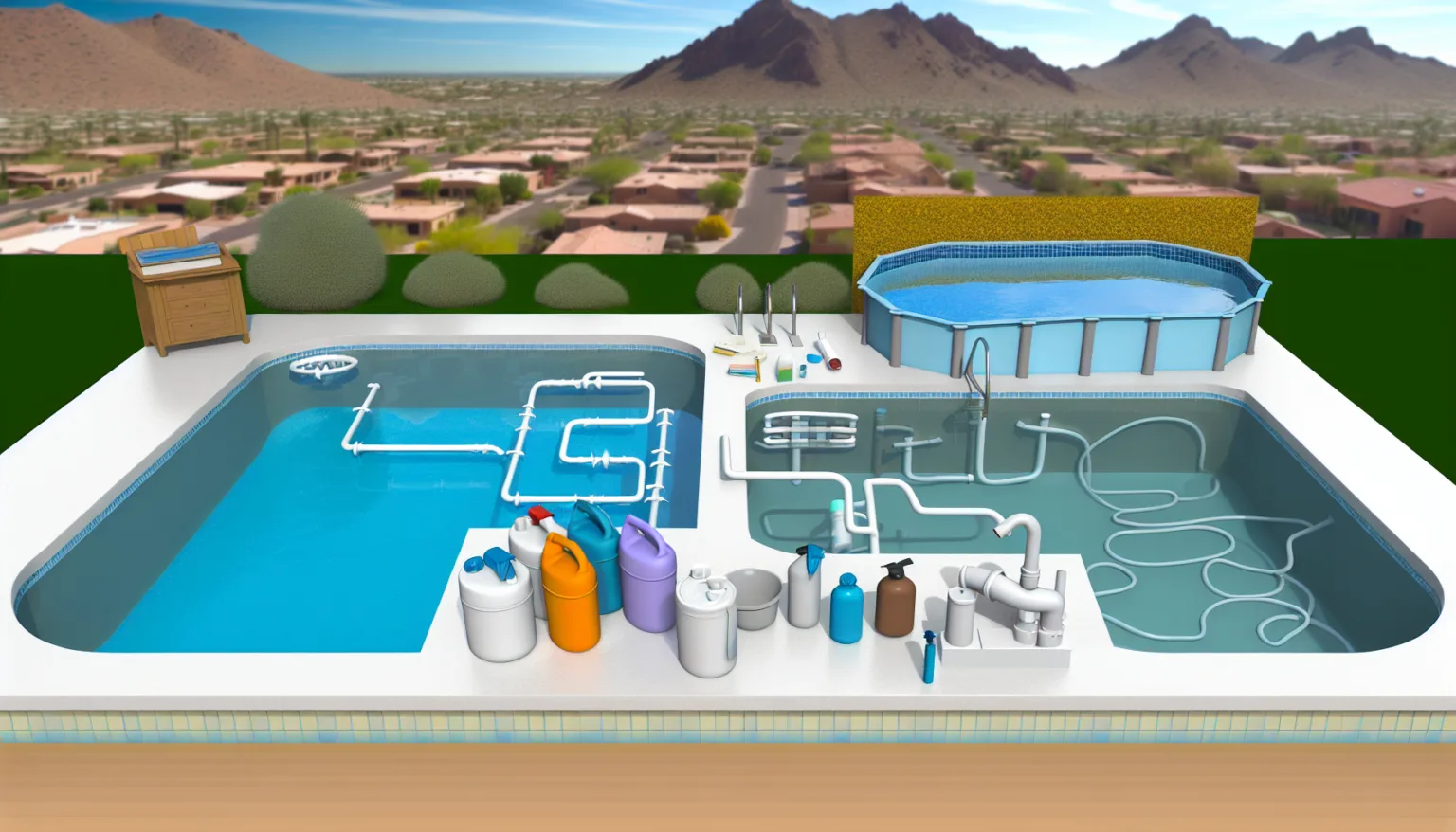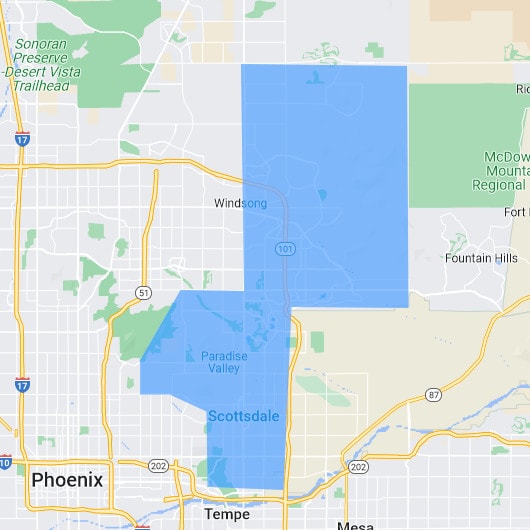Common Pool Pump Issues Fixes
Introduction
Pool pumps are essential for keeping your pool water clean and safe. However, they can experience various problems that affect their performance. This article addresses common pool pump issues such as noisy operations, leaks, low water flow, and overheating and provides practical solutions. It also offers maintenance tips and guidance on when to seek professional help. By the end, you will know how to troubleshoot and maintain your pool pump effectively.
Table of Contents
Understanding Common Pool Pump Problems
Pool pumps are the heart of your swimming pool’s circulation system. They keep the water clean and fresh by pushing it through the filter. But, just like any mechanical device, pool pumps can encounter issues. Understanding these problems and how to address them can save you time and money.
Noisy Operation
A noisy pool pump can be a nuisance. It could be due to worn-out bearings, cavitation, or debris caught in the impeller. Here are some steps to pinpoint and fix the problem:
– Check for debris in the pump basket and impeller.
– Listen for unusual sounds indicating worn-out bearings. If the noise persists, consider pool equipment repair in Paradise Valley for a professional touch.
Leaks
Leaks can spring from various parts of your pool pump, like seals, fittings, or the pump lid. Addressing leaks promptly is crucial to prevent damage and water loss.
– Inspect the pump lid for cracks.
– Check O-rings and seals for wear and tear.
– Tighten fittings if they seem loose.
– If a leak persists, it may be time for a professional intervention.
Low Water Flow
Low water flow can reduce the efficiency of your pool’s filtration system. This issue can be due to clogged filters, air leaks, or an underperforming pump.
– Clean or replace the pool filter.
– Inspect for air leaks in the pump and plumbing.
– Consider upgrading the pump if it can no longer handle the pool’s capacity.
Overheating
Overheating a pump can lead to more severe issues or a complete breakdown. Common reasons include inadequate ventilation, long runtimes, or mechanical failure.
– Ensure the pump area is well-ventilated.
– Schedule regular breaks to prevent prolonged operation.
– Investigate and replace faulty components as needed.
For more information on maintaining pool equipment and handling common issues, consider looking into pool safety guides provided by the Consumer Product Safety Commission for additional tips and advice.
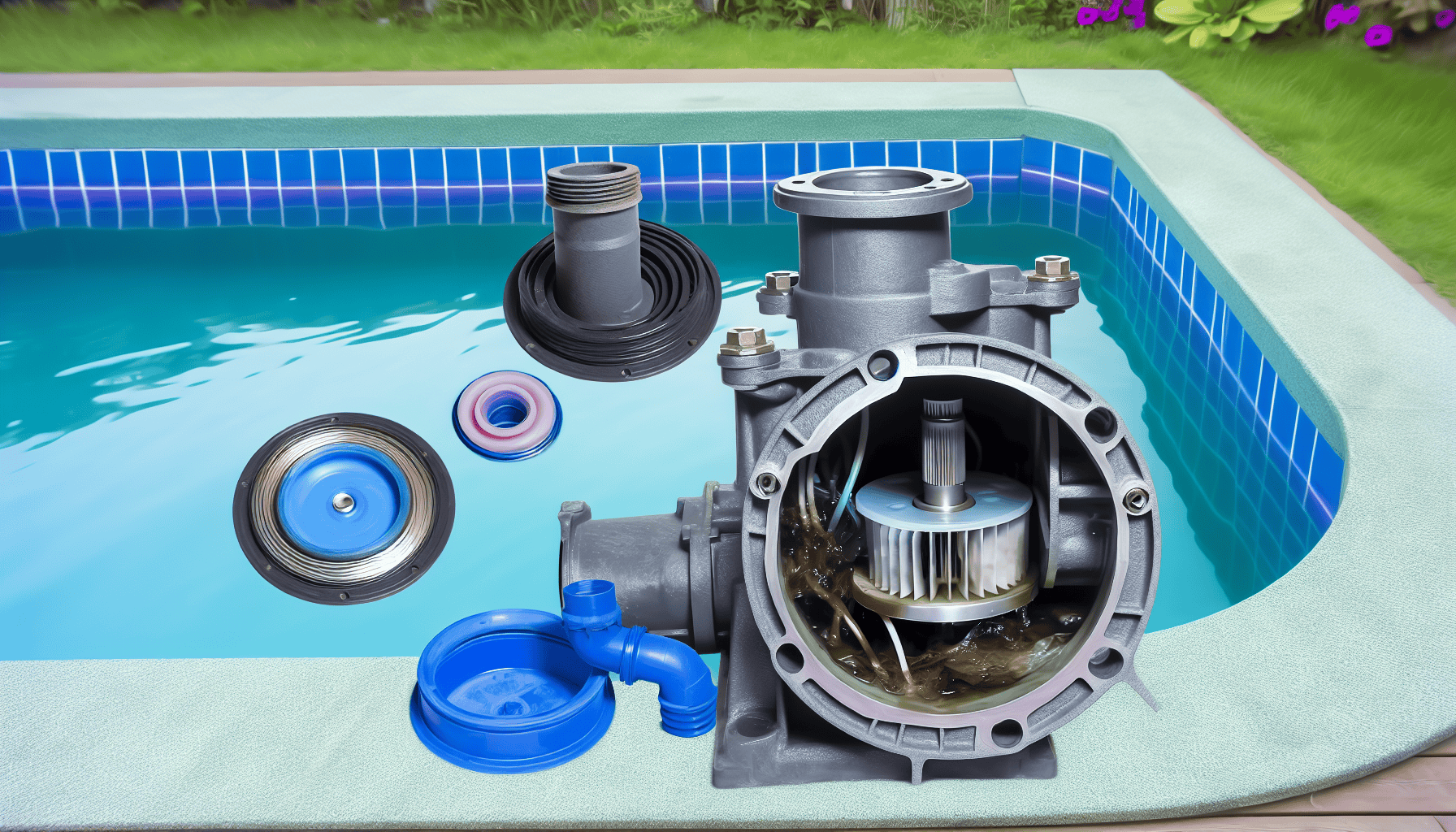
Diagnosing Noisy Pool Pumps
A noisy pool pump can be an annoying disruption to your backyard oasis. Fortunately, most noise issues stem from easily identifiable causes. Let’s break down the common culprits behind noisy pool pumps.
Impeded Impeller
A jammed or clogged impeller can make an awful racket. Small debris, such as leaves, twigs, or hair, can get into the pump and cause blockages.
– Turn off the pump and disconnect the power.
– Open the pump housing and inspect the impeller for debris.
– Clean out any obstructions and replace the housing.
Worn-Out Bearings
Over time, the bearings in the motor can wear out, leading to grinding or screeching sounds. This problem is more technical and may require professional help.
– Listen for high-pitched noises, often a sign of bearing issues.
– If you suspect the bearings are the problem, it’s best to consult a professional for pool pump repair in Scottsdale.
Cavitation
Cavitation occurs when the pump isn’t getting enough water, causing bubbles to form and collapse inside it, which can make loud noises.
– Check the water level in your pool to ensure it’s adequate.
– Inspect the skimmer and suction lines for any clogs or blockages.
– Make sure the pump is adequately primed and properly installed.
Loose Components
Sometimes, parts of the pump can become loose over time. Vibrations can cause screws, bolts, or other components to loosen, leading to rattling or humming noises.
– Turn off the pump and inspect it for loose screws and bolts.
– Tighten any components that are not secure.
– Check for any signs of wear and replace parts if necessary.
If you’re unsure about diagnosing or fixing the issue, don’t hesitate to seek professional help.
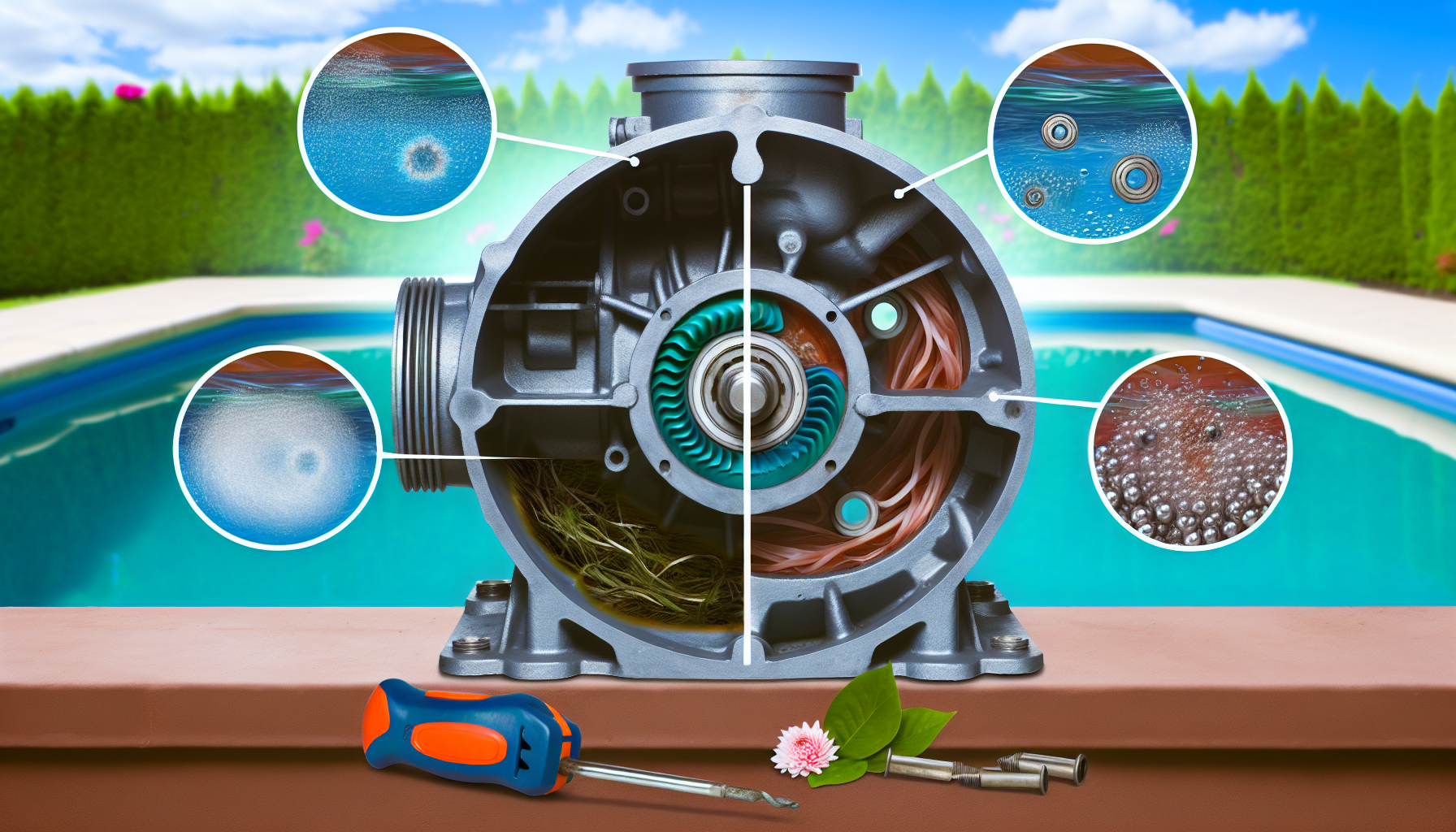
Mechanical Pump Leaks
Mechanical leaks in your pool pump can spell trouble if not addressed quickly. If left unattended, leaks can lead to reduced efficiency and even significant damage to the pump. Here’s how you can diagnose and fix common leaks.
Pump Housing Leaks
Leaks from the pump housing are often the result of cracks or poor sealing.
– Inspect the pump housing for visible cracks.
– Check the O-ring and lid seal for wear and tear.
– Replace any damaged parts and ensure the lid is properly tightened.
Shaft Seal Leaks
The shaft seal prevents water from seeping along the motor’s rotating shaft. If this seal fails, water can leak out.
– Disconnect the pump from power and remove the motor from the assembly.
– Inspect the shaft seal for signs of wear or damage.
– Replace the shaft seal if necessary. If you’re unfamiliar with this process, it’s wise to consult a professional technician.
Plumbing Joint Leaks
Leaks can also occur at the plumbing joints connected to the pump. Over time, joints can become loose or damaged.
– Examine the pipes and joints for leaks.
– Tighten any loose fittings.
– Replace damaged joints or pipes to ensure a secure fit.
Pump Lid Leaks
A leaking pump lid can be due to a worn or improperly seated gasket.
– Check the pump lid O-ring for signs of deterioration.
– Lubricate the O-ring with a suitable silicone lubricant.
– Ensure the lid is tightly closed.
Don’t hesitate to get professional assistance if you’re dealing with a leak and feel it’s beyond your DIY skills. Complex issues often require advanced knowledge and tools. For routine checks and maintenance to avoid mechanical leaks, consider weekly pool cleaning services to keep your pump in shape.
For additional resources, the American Red Cross provides helpful pool safety tips to increase your awareness and preparedness for pool maintenance.
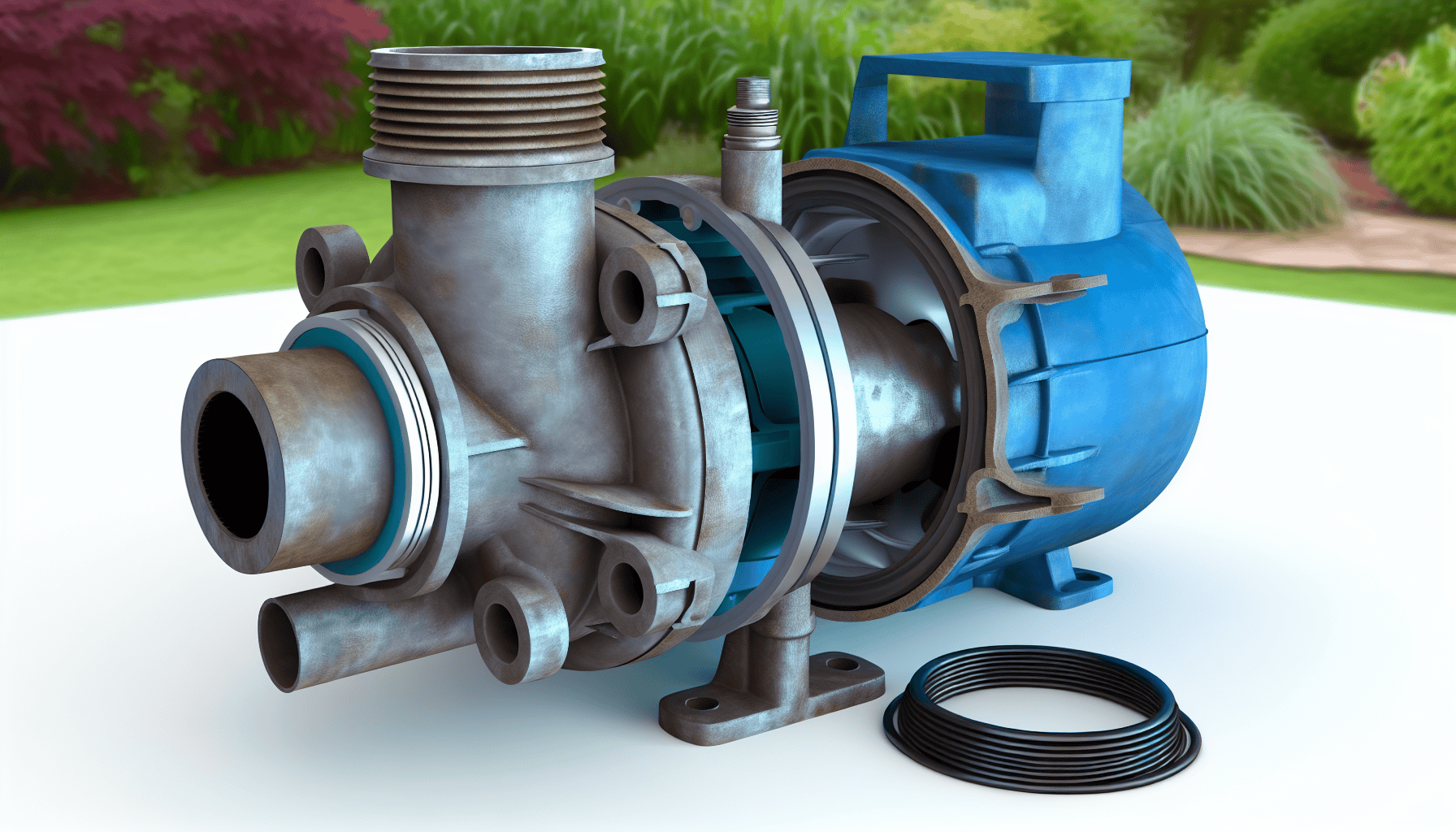
Addressing Low Water Flow
Low water flow can hamper your pool’s filtration efficiency. Addressing this issue promptly is crucial to maintaining clean and healthy water. Let’s explore common causes and solutions for low water flow.
Clogged Filters
A clogged or dirty filter is a common reason for reduced water flow.
– Inspect the pool filter for debris and dirt buildup.
– Clean or replace the filter as needed.
– Perform regular filter maintenance to ensure optimal performance.
Air Leaks
Air leaks in the suction line can cause low water flow and decreased efficiency.
– Check for bubbles in the pump strainer.
– Inspect the suction line for leaks, cracks, or loose fittings.
– Tighten any loose connections and repair or replace damaged parts.
Undersized Pump
An undersized pump may not provide adequate water flow for your pool’s size and needs.
– Evaluate the pump’s capacity and compare it with your pool’s requirements.
– Consider upgrading to a larger pump if necessary.
– Consult a professional for expert advice on selecting the right pump for your pool.
Clogged Impeller
Debris can clog the impeller, restricting water flow and reducing pump efficiency.
– Turn off the pump and disconnect the power.
– Open the pump housing and inspect the impeller for debris.
– Remove any obstructions and reassemble the pump.
Valve Issues
Improperly set or malfunctioning valves can affect water flow.
– Check the valve settings and ensure they are correctly adjusted.
– Inspect the valves for signs of wear and damage.
– Replace or repair faulty valves as needed.
For more insights and professional help, consider looking into our saltwater pool service options. Regular maintenance and timely fixes can keep your pool running smoothly.
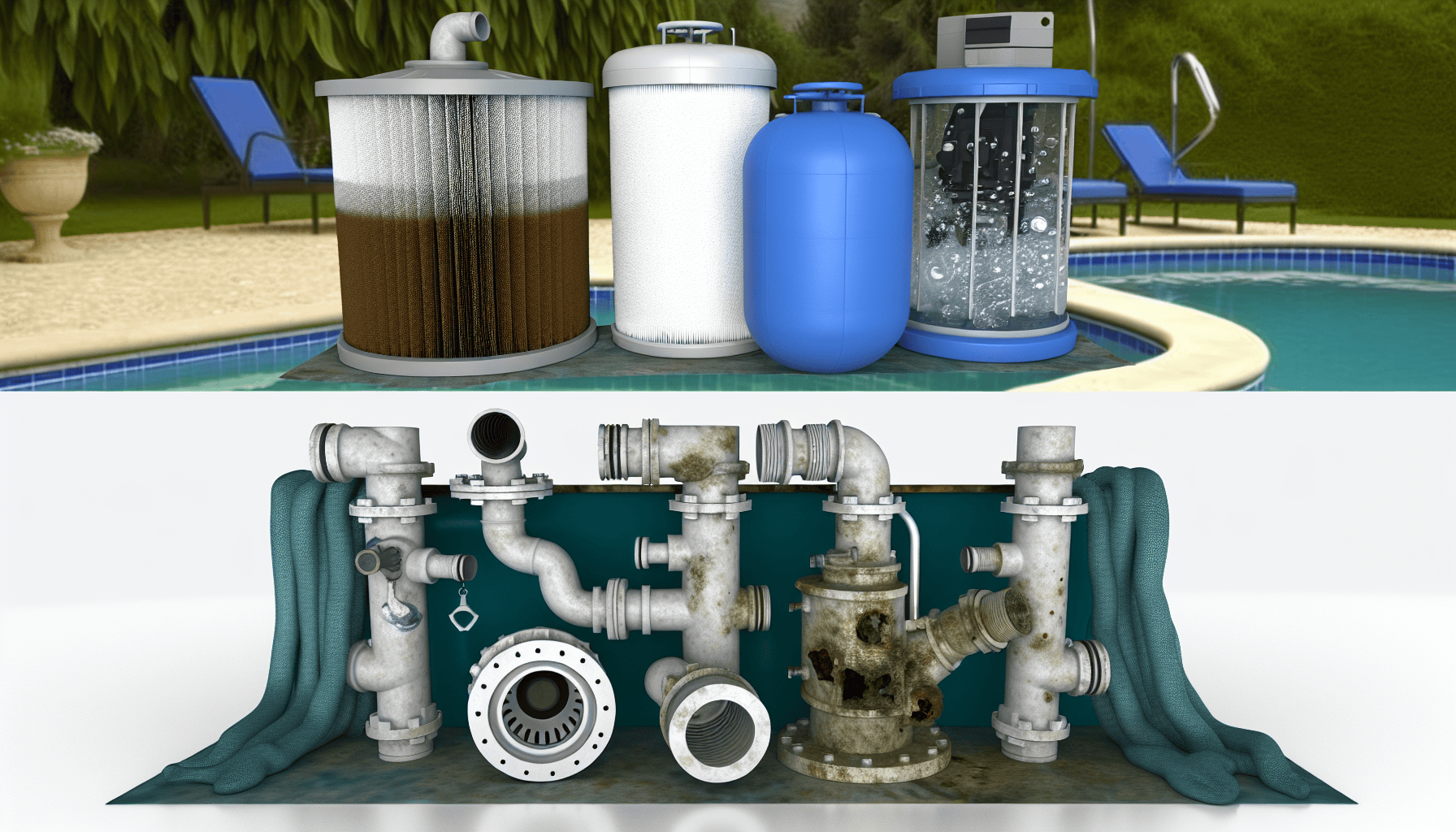
Handling Pool Pump Overheating
Overheating a pool pump can indicate underlying issues that, if not addressed, can lead to more severe problems. Here are some common causes of overheating and steps to address them.
Poor Ventilation
Insufficient airflow around the pump can cause it to overheat.
– Ensure the pump is placed in a well-ventilated area.
– Clear away any debris or obstacles around the pump.
– Install a fan or ventilation system if necessary.
Overworking the Pump
Running the pump for extended periods can cause it to overheat.
– Set a timer to manage the pump’s runtime.
– Give the pump regular breaks to cool down.
– Ensure the pump isn’t running continuously without need.
Mechanical Failure
Internal mechanical issues can lead to overheating.
– Listen for unusual sounds indicating worn-out bearings or a clogged impeller.
– Inspect and clean the impeller.
– Replace worn-out bearings or other faulty components.
Electrical Problems
Electrical issues like incorrect voltage can lead to pump overheating.
– Verify that the pump is receiving the correct voltage.
– Check for loose or faulty wiring connections.
– Consult an electrician if you suspect an electrical issue.
Incorrect Pump Size
Using a too-large or too-small pump for your pool can lead to inefficiency and overheating.
– Ensure the pump’s size matches your pool’s requirements.
– Consult a professional to determine the appropriate pump size if uncertain.
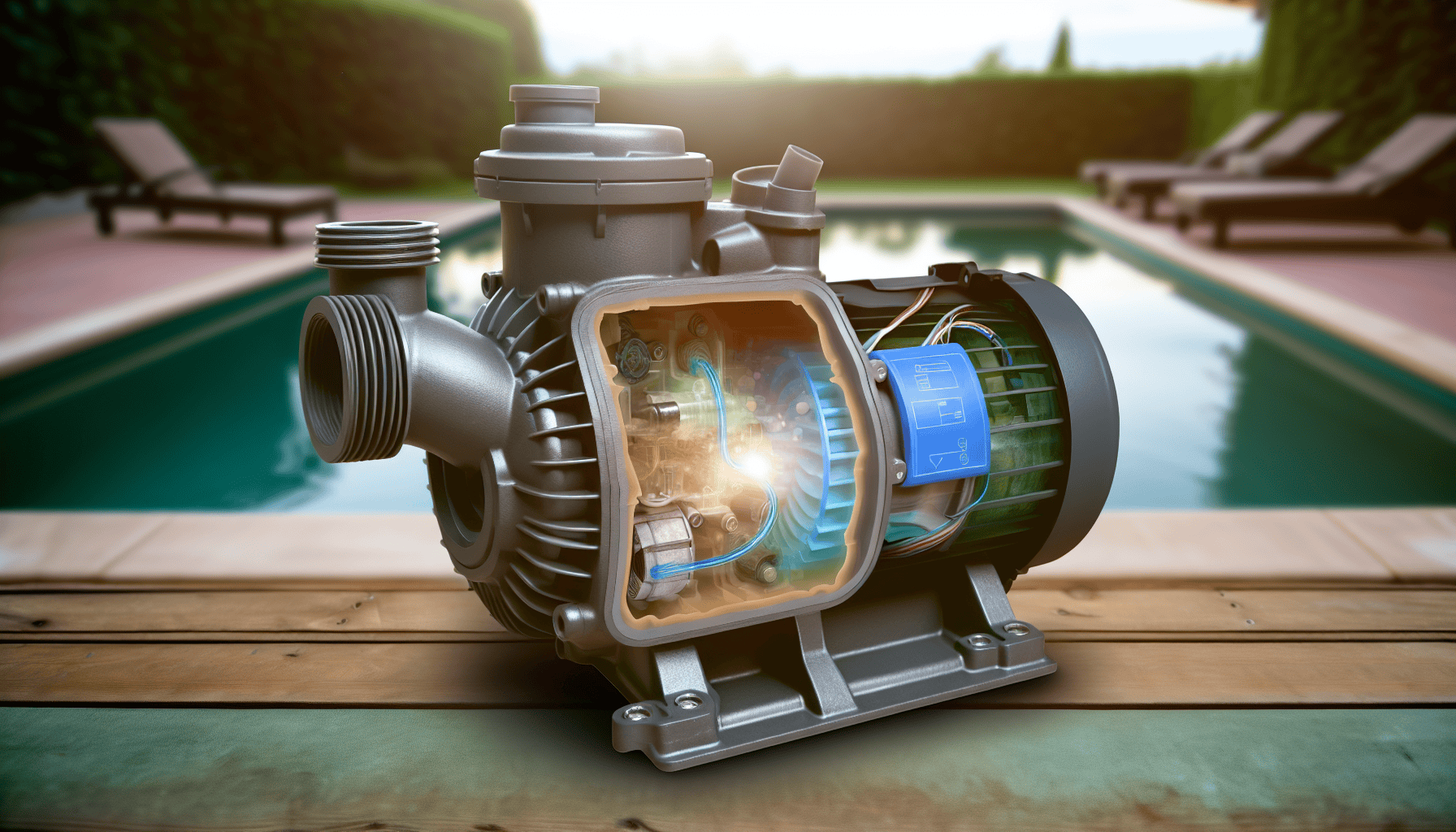
Routine Pool Pump Maintenance
Routine maintenance is key to keeping your pool pump running smoothly and efficiently. Proper care and regular checks can help prevent many common issues. Here are practical maintenance tips to extend the life of your pool pump.
Regular Cleaning
Debris can hinder your pump’s performance.
– Empty the pump basket frequently to prevent clogs.
– Remove any debris from the skimmer and strainer baskets.
– Maintain clean surroundings around the pump to avoid blockages.
Inspect Seals and O-Rings
Worn seals can cause leaks and reduce efficiency.
– Check the pump lid O-ring and other seals for signs of wear.
– Lubricate seals periodically with a silicone-based lubricant.
– Replace worn or damaged seals immediately.
Monitor and Replace Filters
Clean filters ensure maximum water flow and filtration efficiency.
– Inspect filters regularly for dirt buildup.
– Clean cartridge filters or backwash sand filters as per manufacturer recommendations.
– Replace filters according to the manufacturer’s schedule.
Check for Air Leaks
Air leaks can cause the pump to lose prime and reduce water flow.
– Inspect all hoses and connections for cracks or leaks.
– Tighten loose fittings and replace damaged hoses.
– Ensure the pump lid is securely fastened to prevent air entry.
Regular Professional Check-ups
Sometimes, it’s best to let the experts handle it.
– Schedule annual inspections by a professional.
– They can spot potential issues before they become serious problems.
– Ensure all components are working at peak efficiency.
Incorporating these tips into your maintenance routine can save you headaches. For more specialized care, consider our comprehensive pool draining service, which is an effective way to maintain your pool’s health and longevity.
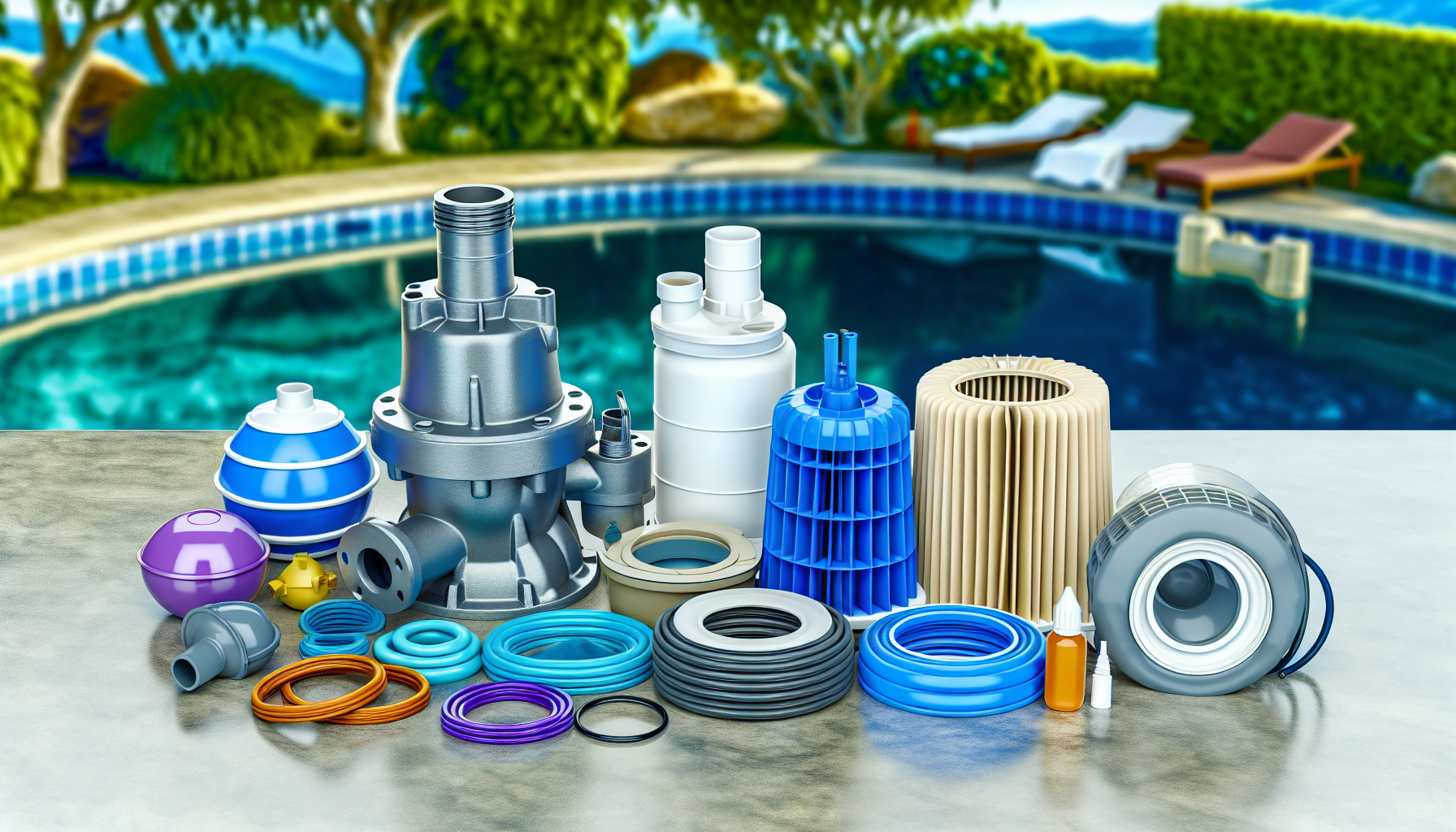
When to Call a Professional
While some pool pump issues are manageable, others require professional expertise. Knowing when to call a pro saves time and prevents further damage. Here are some scenarios that warrant professional help.
Persistent Leaks
Leaks that persist despite DIY efforts need expert attention.
– If you’ve replaced seals and tightened fittings, but the leak continues, it’s time to call a pro.
– Professionals can identify and fix hidden issues causing leaks.
Electrical Problems
Handling electrical components can be risky without proper training.
– If the pump isn’t receiving power or you suspect faulty wiring, contact an electrician.
– Electrical issues should only be handled by certified technicians.
Strange Noises
Unusual sounds like grinding or screeching could indicate serious internal problems.
– Noises often signal worn-out bearings or motor issues.
– Professionals can accurately diagnose and fix these problems.
Overheating
If your pump frequently overheats despite ensuring proper ventilation and runtime management, seek professional help.
– Persistent overheating can lead to permanent damage or pump failure.
– Experts can pinpoint the root cause and provide lasting solutions.
Complex Mechanical Repairs
Some mechanical repairs require specialized tools and expertise.
– Issues like motor replacement or extensive internal repairs should be left to the pros.
– Attempting complex repairs without proper knowledge can worsen the problem.
Upgrade or Replacement
Professional guidance ensures you choose the right equipment when considering a pump upgrade or replacement.
– Professionals can recommend the best pump for your pool’s size and needs.
– Proper installation by a pro ensures optimal performance.
Check out our pool equipment services in Paradise Valley for expert assistance with persistent issues.
To learn about safe pool maintenance practices, visit the Consumer Product Safety Commission’s pool safety tips page for valuable advice.
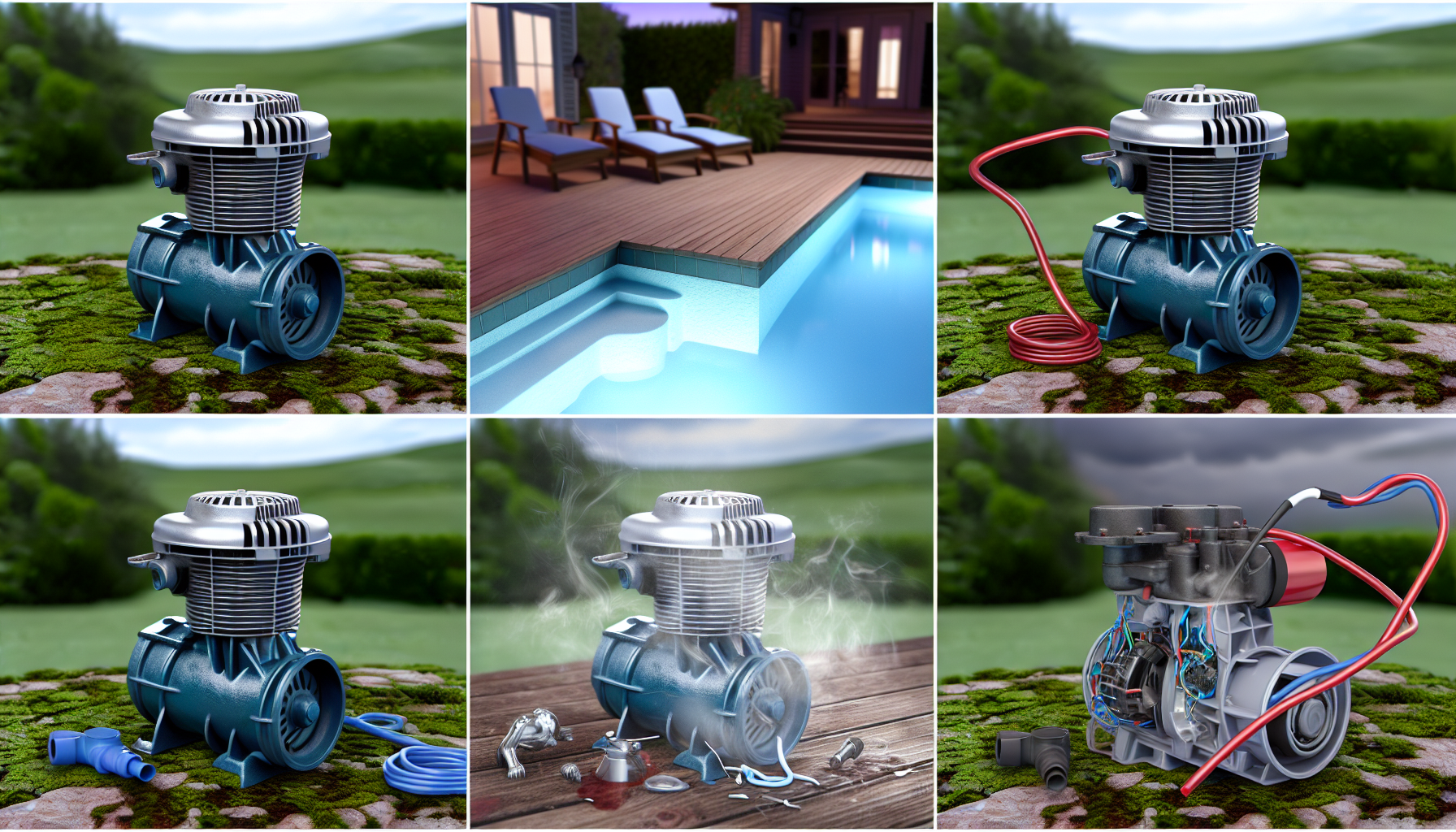
FAQs
Addressing frequently asked questions about pool pumps can help you troubleshoot common issues more efficiently. Here are some FAQs and their answers.
Why is my pool pump making a loud noise?
A noisy pool pump can be due to several reasons:
– Impeller clogged with debris
– Worn-out bearings
– Cavitation from air pockets or inadequate water supply
How often should I clean my pool pump filter?
Regular cleaning is essential to keep the pump running efficiently.
– Sand filters: backwash every 1-2 weeks.
– Cartridge filters: clean every 2-4 weeks.
– Diatomaceous Earth (DE) filters: backwash every 1-3 months.
Refer to your pump’s manual for specific recommendations.
What should I do if my pump is leaking water?
If your pump is leaking:
– Inspect for damaged seals and O-rings.
– Tighten any loose fittings.
– Replace cracked or broken pump parts.
Professional help may be required for persistent leaks.
How can I prevent my pool pump from overheating?
Overheating can be minimized by:
– Ensuring proper ventilation around the pump.
– Avoiding prolonged runtimes.
– Regular maintenance to keep parts functioning well.
If overheating issues persist, consider consulting a professional.
What size pool pump do I need?
The pump size depends on the size of your pool.
– Calculate the volume of water in your pool.
– Consult a professional to recommend the right pump size.
Using an undersized or oversized pump can lead to inefficiency and potential damage.
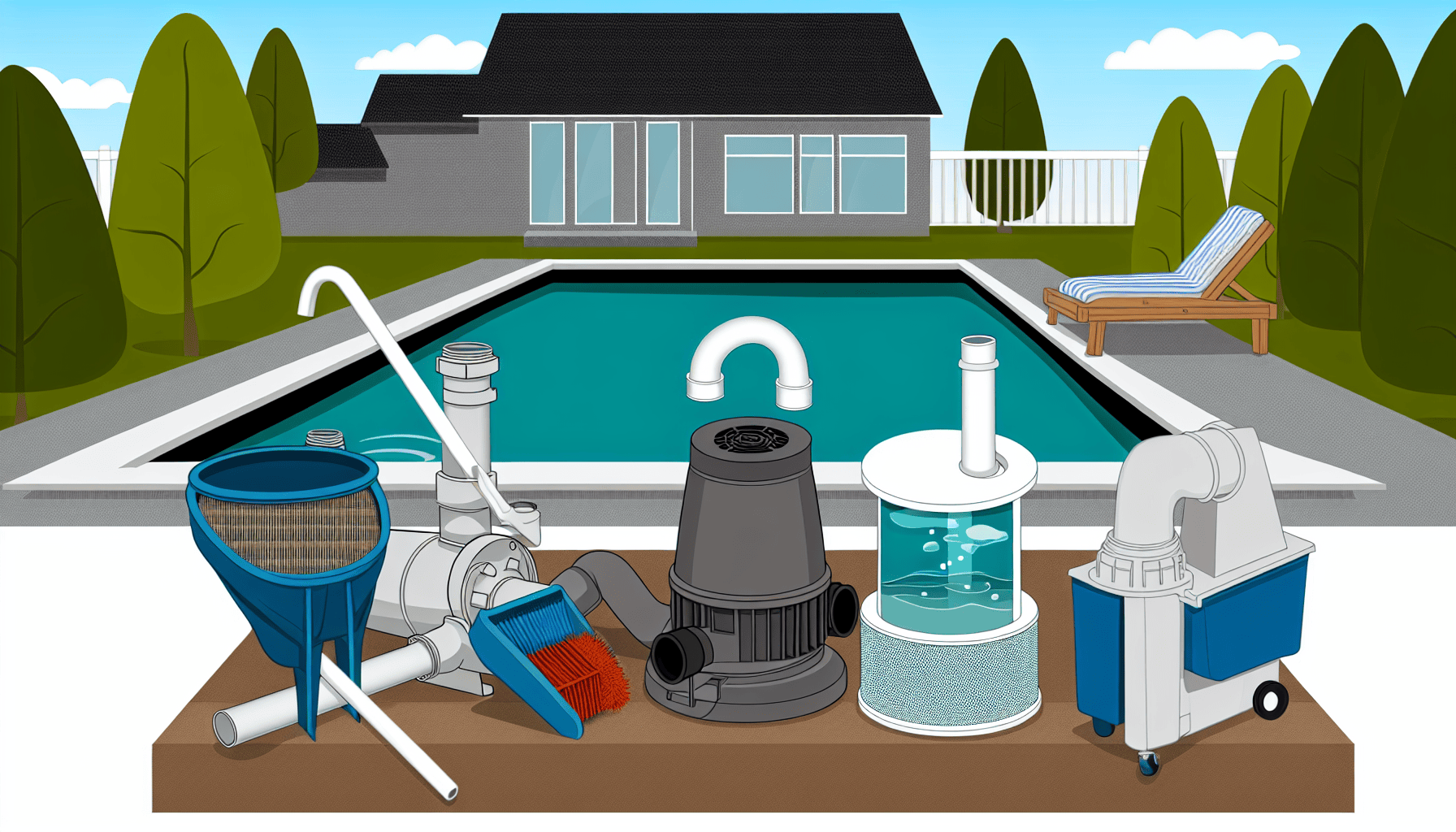
Conclusion
Maintaining your pool pump is crucial for keeping your pool clean and enjoyable. By understanding common issues like noisy operations, leaks, low water flow, and overheating, you can address problems before they escalate. Regular maintenance and timely intervention can keep your pool pump running smoothly. When in doubt, don’t hesitate to call in professionals for assistance.
Remember, a well-maintained pool pump not only extends the life of your equipment but also ensures a safe and pleasant swimming environment. For comprehensive support and expertise, consider our professional pool services to keep your pool in top condition. Dive into a worry-free swimming experience today!

